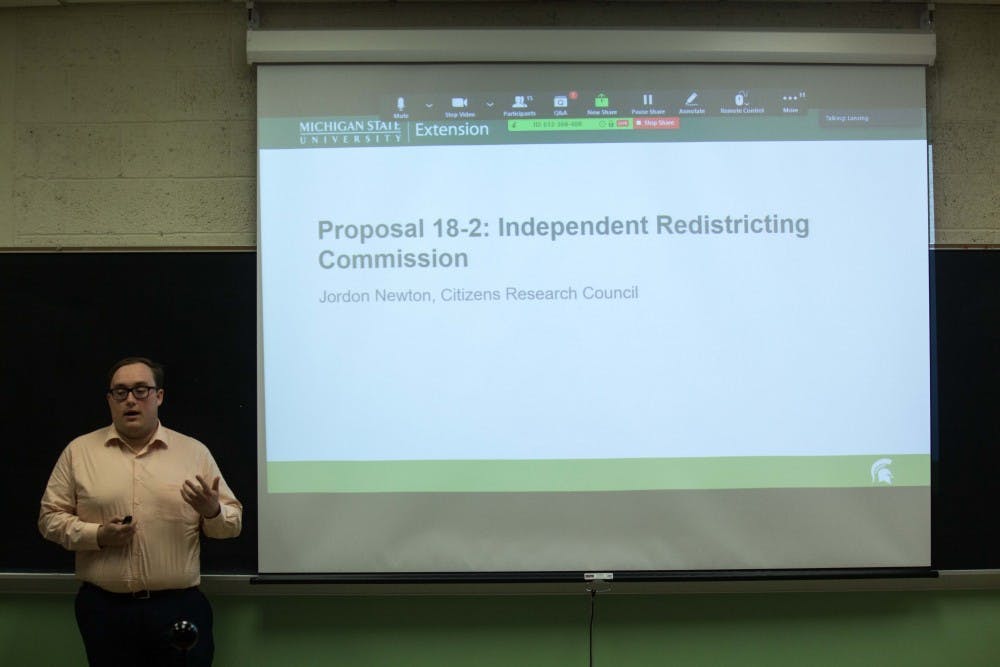Michigan voted “Yes” on three different proposals on the Nov. 6 ballot— allowing for recreational marijuana, an independent redistricting commission and an expansion of voter rights. Here’s what the passing of Proposals 1, 2 and 3 means for Michigan’s future.
Proposal 1 - Recreational marijuana
Proposal 1 passed with 54.95 percent of total votes. This proposal will legalize recreational marijuana use and possession in the state of Michigan. The tax revenue from marijuana sales is expected to go toward improving Michigan roads and supporting schools.
A representative from pro-Proposal 1 group Yes on 1 talked about the results of the election and commented on where marijuana use might go in Michigan.
“We’re thrilled with the election results and that Michigan voters resoundingly passed Proposal 1 and agree with our position that regulation and taxation of marijuana is a far better solution than prohibition,” Yes on 1 said.
Yes on 1 said they hope the people of Michigan will stay informed about the specifics of Proposal 1 and pay close attention to how the forthcoming legislation unfolds.
“In terms of what comes next, it’s important for the public to understand that just because Proposal 1 passed right now, the law doesn’t actually take effect until 10 days after the election results are certified,” they said. “Even when personal possession becomes legal, people shouldn’t be going out in the streets and smoking joints in celebration because public consumption is illegal.”
Scott Greenlee, president of Healthy and Productive Michigan—an anti-Proposal 1 group in Michigan—spoke at a press conference on the night of the election and at another the following day.
“The results are now in, and it’s clear that the people of Michigan have voted to approve Proposal 1 and legalize recreational marijuana in Michigan, a decision that our committee and our partners think is extremely misguided and likely misinformed, but nonetheless that’s where we’re at today,” Greenlee said.
Greenlee addressed the concerns of communities who wished to opt out of the implications of the proposal.
“The devil’s in the details,” Greenlee said. “This proposal is not only ambiguous, but it’s cumbersome and it’s just not well-written. The lawyers will probably have something to say about that and hopefully what they say is communities can get out of this before it even gets started.”
Proposal 2 - Redistricting commission
Proposal 2 passed with 59.87 percent of total votes with a goal of ending the practice of gerrymandering in Michigan.
Gerrymandering refers to the drawing of district maps in favor of a political party. Proposal 2 would create an independent commission of randomly chosen voters to draw districts transparently, with all meetings, materials and methods used being accessible to the public.
Four Republicans, four Democrats and five independent or third party-affiliated voters would staff the commission, with final maps requiring the approval of at least seven members — two of whom must come from each group.
“Our state constitution begins with ‘all political power is inherent in the people,’” said Katie Fahey, founder and executive director of pro-Proposal 2 group Voters Not Politicians. “We’ve proven that when a thoughtful group of passionate citizens band together to try and fix the problems our politicians won’t, we can make our state a better place.”
More than 425,000 signatures were collected across Michigan to secure Proposal 2’s place on the 2018 ballot, according to a press release from Voters Not Politicians.
Proposal 3 - Voter access
Proposal 3 passed with 2,268,093 votes and an approval ratio of almost two-to-one. This proposal is a collection of provisions that would work to improve Michigan voters’ access to the polls.
The proposal’s passage can significantly affect the way college students vote using absentee ballots.
Support student media!
Please consider donating to The State News and help fund the future of journalism.
“This proposition changes a lot of stuff here in Michigan to make it so that every voter has the chance to cast a ballot,” said Eli Pales, president of the MSU College Democrats. “The implications that will have on our elections will be huge for young voters and those that have been historically disenfranchised.”
The provisions include no-reason absentee voting, automatic voter registration upon receiving state ID and same-day voter registration in the two weeks leading up to Election Day.
Wayne State College Democrats President Zoe Pidgeon held similar beliefs, saying automatic registration takes the burden off students and allows greater voting access for those renewing state-issued IDs.
“In having no-reason absentee voting, it completely changes the way students think about going to the polls,” Pidgeon said. “It doesn’t necessarily have to be a thing you have to take time out of your class schedule, out of your work schedule, for.”
The proposal’s passage has led Michigan to join 17 other states in allowing same-day voter registration.
“Before today, we had a registration deadline. You had to register at least four weeks in advance. There are new voters who might not know there is a registration deadline,” Pales said.
Discussion
Share and discuss “All three statewide ballot proposals pass” on social media.







